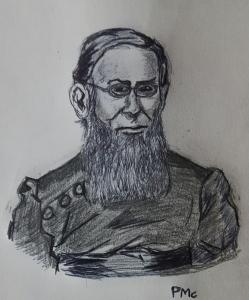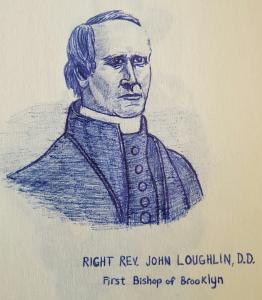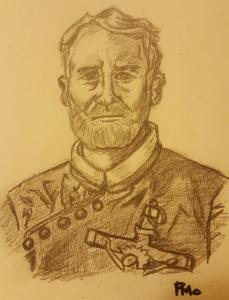“And the string of his tongue was loosed; and he spoke right.”
To enable us to speak right the Son of God must loosen our tongues by a special grace, sometimes by a miracle of grace; for our conversation is too often friv olous, sometimes uncharitable, seldom devoted to spirit ual things. Not many laymen realize that there is such a thing as an apostolate of conversation. Mere talk there is no such thing to a true-hearted Christian. His very prattle with his children is full of edification as well as happiness. A wise man strives hard to instruct his company as well as to amuse them. The very crumbs from a rich soul s table-talk, feed plentifully another soul hungering for truth.
There is even some advantage in the conversational apostolate over that of the public platform. Conversa tion is the personal force of a man brought to its high est potency. The advantage of truth over error is high est when most concentrated, particularized, segregated from the crowd. The contrast between certitude and doubt is most vivid when exhibited in two or three typical specimens. One at a time is a rule of true progress. My public lecturer is as far above me intellectually as he is physically, when I hear him from his elevated platform in a great assembly. But when he and I are alone he has me at close quarters, he projects truth into my soul at point-blank range. This holds good when he is an or dinary friend, and his only advantage over me is that he is right and knows it, and I am wrong and know it, or at least suspect it. If we are on a footing of equality as to education, and I am wholly unequal to him as to the great verities of time and eternity, then his feeble ness of arm but sets off the mighty force of his weapon ; just a humble neighbor of mine, and yet equipped by his Catholic truth to be my angel of peace and joy in the Holy Ghost. David had no advantage in the armor of Saul and in his spear, ” for he was not accustomed to it ” ( I Kings xvii. 39). But he knew all about the shepherd s sling, and could pick skillfully the right sort of stones from the brook, and thus he could slay Goliath. Many a theo logian s armor and spear fail, where the gentle force of kindly talk wins a godlike victory.
The primary rule of religious talk is not prudence, nor caution, nor reticence, nor peacefulness, but affec tionate interest in your hearer s immortal destiny. The word of command is not, ” Take care,” but ” Forward.” What good can I do him? What happiness can I give him ? What delusion can I save him from ? These are the purposes in hand. If I am not a crank I shall easily be kindly; if I am sincere I cannot help but be truthful
and candid. Say to men, ” Don t bully, don t interrupt, don t sneer,” and you have said enough in the interests of prudence. But you cannot ever say enough to hearten me to take hold of devout topics in ordinary conversation.
At a certain street corner in Rome there is seen to-day a bronze slab with this inscription : ” Here Philip Neri chatted about God.” This commemorates the Saint s street corner apostolate. For sixteen years, all that time only a layman, did Philip talk in the streets to idlers and chance acquaintances about God and heaven and hell and truth and error, and the beauty of virtue, the hatefulness of vice. Only under dire compulsion would he become a priest; and this was not only from humility, but also because his life as a talking layman was so amply fruitful of souls.
In recreation, in business, in the family circle, in the round of daily intercourse of all kinds, a true man is eager for propagating truth. Providence will not fail both to give him opportunity and to bestow upon his zealous conversation a full harvest of souls.
Only a comparatively few public speakers can ever be engaged in the conversion of America. But there can be an uncounted multitude of private talkers nay, there must be whose influence shall necessarily be as universal as efficacious. When an old-stock Catholic recalls the beginnings of his religious life, he forthwith thanks God for the zeal and intelligence of his parents. They were his apostles. St. Augustine, in praying to God for his mother s soul, exclaims : ” She was twice my mother, in the flesh that I might be born into this earthly light, in heart that I might be born into light eternal;” and he speaks of her household as ” a living branch of God s Church.” Nor are mothers and fathers the only quiet, domestic messengers of God s truth. For the same Saint tells of the profound effect of conversation with friends upon his mind in changing from error to truth. Parents and friends, sweet whisperers of love in our childhood, pleas ant traffickers in holiest truth during the friendly converse of early and later days all these are members of the laity; yet are they vicars of Christ for our little circle as long as they stand true with His Vicar of the universal Church.
What man or woman ever was first taught about God by a priest ? or ever so powerfully influenced towards God by any priest as by some devout relative or friend? The Ecclesia docens is centred at Rome; its truth-teaching springs out in fresh waters of life in each diocese and parish ; and yet it depends on humble lay people for the distribution of its healing and cleansing floods in our families and in all private circles of life.
As to method, the simplest is generally the best. And what is the straightest way to every honest heart? It is to offer him a ride in a chariot whose four wheels are the four last things to be remembered. You will never stray far from the road to doctrinal persuasion, if you keep in that holy vehicle. Men want salvation ; and all the adornments of controversy, as well as all its funda mentals, are valued in proportion to their bearing on the mighty issues of death, judgment, hell, and heaven. The lessons of Calvary are the prime theses of all learning. Show, therefore, that for a man to be wrong as to truth means to be astray as to salvation, and true doctrine is placed where it belongs: inseparably joined to a happy death.
Rev. Walter Elliott, C.S.P., Parish Sermons on Moral and Spiritual Subjects for All Sundays and Feasts of Obligation (New York: Paulist Press, 1913), 322-324.












